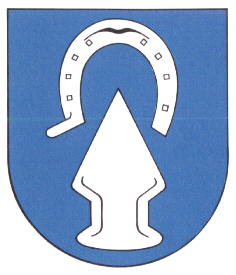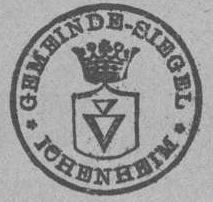Ichenheim: Difference between revisions
Knorrepoes (talk | contribs) m (Text replace - "|width="15%"|50 px|right |}" to "|width="15%"|50 px|right |}<seo title="Wappen, Gemeindewappen" />") |
Knorrepoes (talk | contribs) m (Text replacement - "Additions :" to "Additions:") Tags: Mobile edit Mobile web edit |
||
| (27 intermediate revisions by the same user not shown) | |||
| Line 1: | Line 1: | ||
'''ICHENHEIM''' | '''ICHENHEIM''' | ||
State : [[Baden-Württemberg]]<br/> | State : [[Baden-Württemberg]]<br/> | ||
District (Kreis) : [[Ortenaukreis]] (until 1973 [[Lahr (kreis)|Lahr]])<br/> | District (Kreis) : [[Ortenaukreis]] (until 1973 [[Lahr (kreis)|Lahr]])<br/> | ||
Additions : 1972 [[Schutterzell]]<br/> | Additions: 1972 [[Schutterzell]]<br/> | ||
Incorporated into : 1973 [[Neuried]] | Incorporated into : 1973 [[Neuried]] | ||
[[File:ichenhei.jpg|center]] | [[File:ichenhei.jpg|center|alt=Wappen von {{PAGENAME}}/Arms (crest) of {{PAGENAME}}]] | ||
= | {| class="wikitable" | ||
In Blau über einer gestürzten silbernen Pflugschar ein silbernes Hufeisen, mit dem rechten Stollen nach unten. | |+Official blazon | ||
|- | |||
|'''German''' | |||
| In Blau über einer gestürzten silbernen Pflugschar ein silbernes Hufeisen, mit dem rechten Stollen nach unten. | |||
|- | |||
|'''English''' | |||
| blazon wanted | |||
|} | |||
===Origin/meaning=== | |||
The arms were designed and adopted in 1900. | The arms were designed and adopted in 1900. | ||
The oldest known seal of the village dates from 1530 and shows a shield with a plough iron. In the 19<sup>th</sup> century the same arms were used on the seal, but now with a wreath or a crown. To distinguish the arms from similar arms with a plough iron, the symbol used by the village on border stones was added in the upper half of the arms; a horseshoe with a small extension on the right. | The oldest known seal of the village dates from 1530 and shows a shield with a plough iron. In the 19<sup>th</sup> century the same arms were used on the seal, but now with a wreath or a crown. To distinguish the arms from similar arms with a plough iron, the symbol used by the village on border stones was added in the upper half of the arms; a horseshoe with a small extension on the right. | ||
[[Literature]] : Huber, 1987 | {|align="center" | ||
|align="center"|[[File:{{PAGENAME}}1892.jpg|center|Siegel von {{PAGENAME}}]] <br/>The municipal stamp shown in 1892 | |||
|} | |||
{{de}} | |||
{{media}} | |||
[[Civic Heraldry Literature - Germany|'''Literature''']]: Huber, 1987 | |||
[[Category:German Municipalities I]] | [[Category:German Municipalities I]] | ||
Latest revision as of 10:35, 28 January 2024
ICHENHEIM
State : Baden-Württemberg
District (Kreis) : Ortenaukreis (until 1973 Lahr)
Additions: 1972 Schutterzell
Incorporated into : 1973 Neuried
| German | In Blau über einer gestürzten silbernen Pflugschar ein silbernes Hufeisen, mit dem rechten Stollen nach unten. |
| English | blazon wanted |
Origin/meaning
The arms were designed and adopted in 1900.
The oldest known seal of the village dates from 1530 and shows a shield with a plough iron. In the 19th century the same arms were used on the seal, but now with a wreath or a crown. To distinguish the arms from similar arms with a plough iron, the symbol used by the village on border stones was added in the upper half of the arms; a horseshoe with a small extension on the right.
| The municipal stamp shown in 1892 |
This page is part of the German heraldry portal |
Heraldry of the World |
|
German heraldry:
|
Selected collector's items from Germany:
|
Contact and Support
Partners:
Your logo here ?
Contact us
© since 1995, Heraldry of the World, Ralf Hartemink 
Index of the site
Literature: Huber, 1987













